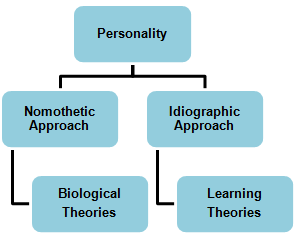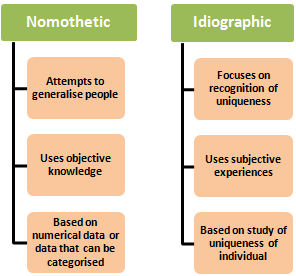Major Approaches to Personality Assessments
There is no single position among psychologists as how to define human personality and debate still rages whether it can be in any way measurable. Below you can learn how different groups of psychologists view human personality and the way they measure it.
Scientific definition
The concept of personality has different meanings in different context and within psychology it has been defined in many different ways. According to trait theorists it can be defined as more or less stable internal factors that make one person’s behaviour consistent over a period of time. This approach known as nomothetic view sees human characteristics stable and almost impossible to change. In contrast idiographic ideology looks at personality as dynamic responding to environment and people around. This view is often associated with proponents of social learning theories. Both of these definitions conclude that personality relies on two key propositions; one concerned with pattern of dispositions and behaviours unique to individual while the other concerned with stable and consistent features that do not change over time. Below paragraphs look more closely at each of these two key propositions.
 |
As discussed the above figure shows two fundamental approaches. Each view makes different assumptions and offers different perspectives as how this concept is understood.
Nomothetic approach
Psychologists adopting nomothetic approach believe that personality is primarily determined by heredity, genetics and biochemistry of our brains. They argue that it is stable, consistent and that environmental factors and social influences have little effect. They believe that traits are source of human personality which makes individual behaviour stable over lifespan. Based on this theory they argue that only a certain basic familiarity with individuals or a modest sampling of their behaviour would make reasonable predictions about their current or future actions in comparable situations. Hence, proponents of this theory view related assessments as valid instrument measures. Trait theories such as Gordon Allport's theory, Raymond Cattell's 16 PF or Hans Eyensck's questionnaires form the underlying bases of this approach upon which the majority of assessments are based.
Idiographic view
Psychologists adopting idiographic approach consider measurement of traits as inappropriate because one person’s responses may not be comparable to another’s. They regard individuals as responding to environment and people around them and see the dynamics of the interactions as playing a critical part in shaping personality. Hence, advocates of this ideology disregard that personality can be measurable and see measurement of traits as inappropriate. They argue that humans are shaped by environmental and social factors. Learning theories such as Social learning theory (Bandura), Operant learning theory or Erikson’s eight stages of development fit into this approach. Below figure summarises the main ideas of each of the approaches.
Further research
As you can see from the above there are two different views as how personality is understood. The disagreement among psychologists still exists as to which view should be widely accepted. Some research indicates that statistical or nomothetic view proved to be more successful nevertheless the subsequent research suggests that a combination of the two methods can be better than either on its own. It is entirely possible that there are general principles that influence human behaviour and that our uniqueness can be understood as a result of external stimuli.
Major Approaches to Personality and its Measurement
There is no single position among psychologists as how to define human personality and debate still rages whether it can be in any way measurable. Below you can learn how different groups of psychologists view human personality and the way they measure it.
How personality is understood
The concept of personality has different meanings in different context and within psychology it has been defined in many different ways. According to trait theorists it can be defined as more or less stable internal factors that make one person’s behaviour consistent over a period of time. This approach known as nomothetic approach sees human personality stable and almost impossible to change. In contrast idiographic approach looks at personality as dynamic responding to environment and people around. This view is often associated with proponents of social learning theories. Both of these definitions conclude that personality relies on two key propositions; one concerned with pattern of dispositions and behaviours unique to individual while the other concerned with stable and consistent features that do not change over time. Below paragraphs look more closely at each of these two key propositions.
As discussed the above figure shows two fundamental approaches. Each view makes different assumptions and offers different perspectives as how personality is understood.
Nomothetic Approach
Psychologists adopting nomothetic approach believe that personality is primarily determined by heredity, genetics and biochemistry of our brains. They argue that personality is stable, consistent and that environmental factors and social influences have little effect. They believe that traits are source of human personality which makes individual behaviour stable over lifespan. Based on this theory they argue that only a certain basic familiarity with individuals or a modest sampling of their behaviour would make reasonable predictions about their current or future actions in comparable situations. Hence, proponents of this theory view personality assessments as valid instrument measures. Trait theories such as Gordon Allport's theory, Raymond Cattell's 16 PF or Hans Eyensck's personality questionnaires form the underlying bases of this approach upon which the majority of assessments are based.
Idiographic Approach
Psychologists adopting idiographic approach to study of personality consider measurement of traits as inappropriate because one person’s responses may not be comparable to another’s. They regard individuals as responding to environment and people around them and see the dynamics of the interactions as playing a critical part in shaping personality. Hence, advocates of this approach disregard that personality can be measurable and see measurement of traits as inappropriate. They argue that personality is shaped by environmental and social factors. Learning theories such as Social learning theory (Bandura), Operant learning theory or Erikson’s eight stages of development fit into this approach. Below figure summarises the main ideas of each of the approaches.
Further research
As you can see from the above there are two different views as how personality is understood. The disagreement among psychologists still exists as to which approach should be widely accepted. Some research indicates that statistical or nomothetic view proved to be more successful nevertheless the subsequent research suggests that a combination of the two methods can be better than either on its own. It is entirely possible that there are general principles that influence human behaviour and that our uniqueness can be understood as a result of external stimuli.



